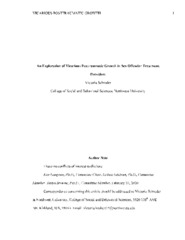An Exploration of Vicarious Posttraumatic Growth in Sex Offender Treatment Providers
Abstract
This study examines the experiences of five clinicians who are currently practicing as sex offender treatment providers (SOTP) from Washington state. An essential component of the phenomenological approach to qualitative research is to represent the subjective experiences and perspectives of the study participants. As such, the semi-structured interview format and use of open-ended questioning served the purpose of capturing the essence of the participants' experience from their perspective. The data were then coded and analyzed to identify the emerging patterns and themes within the participants' experiences. The research resulted in four major themes: 1) Negative Personal and Professional Aspects of SOTP work, 2) Holistic Approach to Treatment Achieved through Clinician Empathy and Client Accountability, 3) Adaptive Coping Skills, and 4) Positive Personal and Professional Aspects of SOTP Work. These emerging themes serve as a framework for discussion and further exploration regarding the experience of SOTPs and the roles of vicarious trauma, empathy, and vicarious posttraumatic growth. This research revealed that SOTPs are a population of clinicians regularly exposed to the graphic details of their clients' sexual offenses and are thus susceptible to experiencing vicarious trauma. The emerging themes from this research, however, revealed that their experience also transcends the effects of vicarious trauma and is representative of individuals who have endured vicarious posttraumatic growth as a result of their meaning-making processes.
Original item type
Microsoft Word (DOCX)
Original extent
120 pages
Collections
Copyright
This original work is protected by copyright. Copyright is retained by the author(s). Works may be viewed, downloaded, or printed, but not reproduced or distributed without author(s) permission.


 Maintained by the Northwest University Library
Maintained by the Northwest University Library